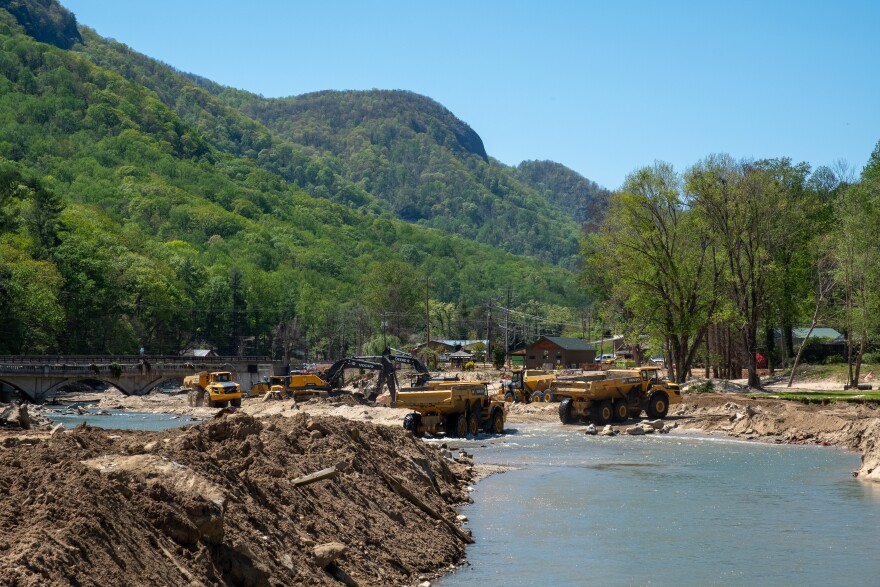Editor's note: This story was co-reported and written by Kinley Andres and Haley Littrel, students at West Henderson High School, in collaboration with Blue Ridge Public Radio reporter Gerard Albert III as part of a Report For America fellowship service project.
Dave and Yates Marsic heard the river before they saw it rushing toward their Lake Lure home, where they’d lived for six years.
What they were hearing were massive boulders crashing through the river and into the lake as the water levels continued to rise.
“We heard these big loud crashes, these big booms, and nothing like I’ve ever heard before. When you got close, you could feel it in your chest,” said Dave Marsic.
The town of Lake Lure escaped some of the major damage that other communities experienced during the storm, but the lake – the town’s economic driver – was unrecognizable after the flooding.
The Marsics' home was spared from the significant flooding that overtook the area, but the couple still had to overcome other aftermath effects of the storm.
The storm pushed them to move out of the rural town and closer to the suburbs after Hurricane Helene damaged infrastructure like roads, water plants and houses.
Yates' 90-year-old parents also live in Hendersonville and the daily commute to visit them became "grueling." The main route into the city is US 64, which is still closed to most drivers.
"Before, it only took me about 25 minutes to get to them. And then after the hurricane, it took me about an hour and a half to get to them," she said.
People leaving areas affected by natural disasters is not uncommon, especially in rural parts of the country, according to Nathan Dollar, who leads Carolina Demography.
" We expect there to be a population decline in the short term in all the areas that were affected by Helene," he said. "But we also expect that those populations will rebound in the years after."
He has witnessed similar trends after Hurricane Katrina and Hurricane Harvey.
"People move out in the short term, but then people ultimately move back," he said.
Lake geography aided in destruction
The Broad River runs into Lake Lure, and during the storm carried millions of tons of debris into the area's largest tourist attraction.
“We saw debris all over the place. We saw houses halfway in. We knew immediately that anyone in the river would not have made it, so it was super sad to think that we were safe on the ground there as the river continued to rage,” said Yates.
While the Marsics were not stuck in their home, they were limited to certain areas of the town due to road closures caused by fallen trees and detrimental water damage. Throughout the days after the hurricane, the Marsics spent their time helping others in their community, as well as cleaning up stray branches from their property.
Witnessing the damage from the hurricane first-hand, the couple described feeling extremely emotionally drained.
“You just felt like everything had washed away and nothing was going to be normal again,” Yates said.
The Marsics are now living in Hendersonville, where the nearest open shops are a five-minute drive instead of an hour drive like it was in Lake Lure.
The couple plans to keep their home in Lake Lure and may use it as a vacation home.
“One of the things that not a lot of folks mention about the areas that are devastated is just the amount of time it's gonna take for things to get back – home values, infrastructure, government services, all that stuff,” Dave said.


